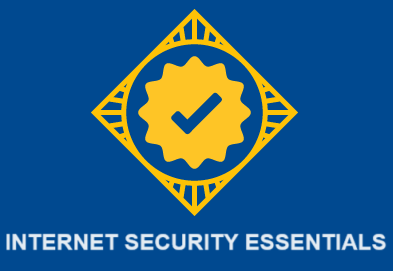In our increasingly digital world, the internet plays a vital role in our daily lives—from online shopping and banking to communication and entertainment. However, as we become more dependent on the web, cyber threats are also growing rapidly. Protecting yourself online has become as essential as locking your front door. Understanding the Internet Security Essentials can help you safeguard your personal data, maintain privacy, and ensure safe browsing habits.
What Is Internet Security?
Internet security refers to the collection of strategies, technologies, and best practices designed to protect online users from cyber threats. It covers a wide range of measures—from antivirus software and firewalls to secure browsing habits and data encryption. Its primary goal is to keep unauthorized users from accessing or stealing your information.
Why Internet Security Matters
Every day, hackers attempt to exploit vulnerabilities in systems, steal identities, and commit fraud. Without proper protection, your emails, financial data, and personal files can be compromised in seconds. Internet security is crucial not just for large corporations, but for every individual who connects to the web.
Types of Cyber Threats
1. Malware and Viruses
Malware, or malicious software, includes viruses, worms, trojans, and spyware. These programs can corrupt files, steal data, or even render your computer unusable.
2. Phishing Attacks
Phishing involves fake emails or messages designed to trick you into revealing personal information such as passwords or credit card numbers.
3. Ransomware
This form of malware locks you out of your system or files until a ransom is paid. Ransomware attacks have affected both individuals and major corporations globally.
4. Spyware and Adware
Spyware secretly tracks your online activities, while adware displays unwanted advertisements that can slow down your system.
5. Identity Theft
Hackers use stolen personal information to commit fraud or access sensitive accounts.
6. Data Breaches
When companies or online services suffer security lapses, millions of users’ private data can be leaked and sold on the dark web.
Core Principles of Internet Security
Confidentiality
Only authorized users should have access to private or sensitive information.
Integrity
Your data should remain accurate and unaltered during transmission or storage.
Availability
Your information and services should always be accessible to legitimate users.
Authentication
Verifying that both users and systems are who they claim to be is critical to preventing fraud.
Best Practices for Staying Safe Online
1. Use Strong, Unique Passwords
Avoid using simple passwords like “123456” or “password.” Create strong passwords with a mix of letters, numbers, and symbols, and never reuse them across accounts.
2. Enable Two-Factor Authentication (2FA)
This adds an extra layer of security by requiring an additional verification step—like a code sent to your phone—before logging in.
3. Keep Software and Devices Updated
Updates often patch security vulnerabilities. Always install system and app updates promptly.
4. Avoid Suspicious Links and Downloads
Be cautious about clicking on unknown links or downloading attachments from unfamiliar sources—they could contain malware.
Protecting Your Devices
Install Antivirus and Anti-Malware Software
Reliable security software can detect, block, and remove threats before they cause harm.
Use Firewalls
Firewalls act as a digital barrier between your computer and potential attackers, monitoring incoming and outgoing traffic.
Back Up Your Data Regularly
Store backups on external drives or cloud services so you can recover your files if your device is compromised.
Safe Browsing Practices
Use Secure Websites (HTTPS)
Always check for the padlock icon or “https://” in a site’s address bar before entering sensitive information.
Clear Cookies and Cache
Regularly deleting cookies and cache prevents websites from storing too much personal information about your browsing habits.
Be Wary of Public Wi-Fi
Public networks are often unsecured. Avoid logging into financial accounts or use a VPN to encrypt your connection.
Why You Should Use a VPN
A Virtual Private Network (VPN) hides your IP address and encrypts your online activity, protecting you from hackers and snoopers.
Benefits of using a VPN:
-
Safeguards data on public Wi-Fi
-
Prevents internet tracking by ISPs
-
Enables access to geo-blocked content
-
Adds anonymity while browsing
When choosing a VPN, look for providers with strong encryption, a strict no-logs policy, and fast, reliable servers.
Social Media Security
Social media platforms are breeding grounds for scams and data mining.
Tips:
-
Review your privacy settings regularly.
-
Avoid sharing personal details like your address or vacation plans.
-
Don’t accept friend requests from strangers.
-
Report fake profiles and suspicious activities immediately.
Remember, once something is online, it’s nearly impossible to delete completely.
Email Security Tips
Email remains one of the most common tools for hackers.
-
Double-check the sender’s address before clicking links.
-
Watch out for grammatical errors or urgent language.
-
Use spam filters to block suspicious emails.
-
Never share sensitive information over email unless it’s encrypted.
Online Shopping and Payment Safety
Shop from Trusted Websites
Stick to reputable retailers and check for verified payment systems.
Verify Secure Payment Gateways
Ensure the site uses HTTPS and displays a lock icon before entering card details.
Avoid Saving Payment Information
While convenient, saving payment details can put you at risk if the site is hacked.
Business and Enterprise Internet Security
Companies handle sensitive customer data, making them prime targets for cybercriminals.
Key Measures:
-
Train employees on phishing and data protection.
-
Use multi-layered security systems
